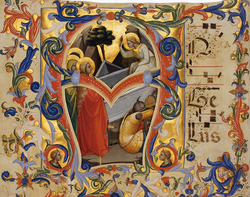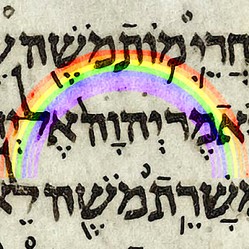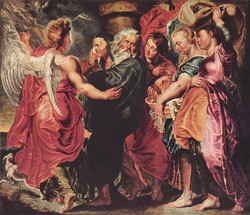The spittle glistened in my hair, running down in rancid disrespect after being expelled from the mouth of the Christian lady.
She was still yelling in my face, calling me words which I'm sure were not sanctioned in the Bible, or perhaps - thinking about the Babylonian Goddess - they were.
I should have felt intimidated. But mostly I felt pity, over-ridden in huge part by the adrenaline rush of containing the danger. You see, she'd picked on the little one, the harmless looking one; I was actually the High Priestess.
"May God forgive you." I calmly told her, while around the corner came the rest of the coven. It could have ended nastily, but I both signaled and told them to walk on by, the High Priest by my side. "And Jesus Christ too."
Used to following our lead in a circle, they did so, though the looks they gave would have impressed Medusa. They were Wiccan, but they were also human beings, and bullying is ugly in any context. The Christians were physically protected that day by two high-ranking witches, even as they protested our right to attend the Pagan convention down the road.
I would like to say that it was an isolated incident. Though rare (and I consider unrepresentative of Christianity as a whole), it was not. But I understood that they were acting within the constraints of their ignorance about what we do and believe, and ultimately they were trying to save us according to their own spiritual reality.
Hence the High Priest and I protected them as feelings ran high, and I'm writing this Wizzle to inform their brethren now.












































 St Tydecho's Churches in West Waleson 09/03/2014
St Tydecho's Churches in West Waleson 09/03/2014
 Goodies for an Outlander Premiere Partyon 03/06/2015
Goodies for an Outlander Premiere Partyon 03/06/2015
 Holocaust Memorial Day Interview with Rainer Höss, Grandson of Rudolf Architect of Auschwitzon 01/24/2015
Holocaust Memorial Day Interview with Rainer Höss, Grandson of Rudolf Architect of Auschwitzon 01/24/2015
 Romantic Valentine Gifts for an Outlander Fanon 01/16/2015
Romantic Valentine Gifts for an Outlander Fanon 01/16/2015



Comments
Samhain, Imbolc, Beltane and Lughnasadh are British/Irish; the equinoxes and the solstices are Anglo-Saxon. That's why there's so much overlap in what's going on regarding divinity in some of them.
Thanks for the information about the two wheels of life combined ino the wiccan wheel. While I knew the wiccan wheel, I did not realize that it was a combination of Saxon and British.
Ah! I see what you're talking about now. Yes, there is most certainly a sacred wheel of the year in Wicca. Itself is an amalgamation of two sacred wheels (one British, one Anglo-Saxon) resulting in eight spokes of the wheel instead of four apiece.
At each position, you may view the Goddess in Her various aspects, and a succession of Gods, within a cyclical story. The God is born, lives large and dies. The Goddess is roaming free as summer, or hibernating in the frozen ground. But that's the agricultural cycle again. There are many, many layers beyond that.
Last night I was chatting with friends about Arianrhod. Her cycle is more akin to the solar system. Her name translates as silver wheel, and we're looking at the stars to explain that one.
Then you get zodiacal ages, which span much longer than a year. When Pisces rose at Spring Equinox, then the fish came to be attached to the dominant religion. Before that it was all about the bulls, or the rams, or the lion. We're reaching the point where it'll be Aquarius rising, hence all of the talk (and great songs) about the Age of Aquarius. That'll see us through the next few thousand years. We'll see water and water-carriers taking over the fish symbolism, regardless of the religion involved.
As a species, we've always looked to the Heavens and the ground for our sacred explanations. As above, so below.
I have been thinking that we see time in a secular way, but ancients regarded it as having a sacred dimension, and religions carry on this idea with their ritual year. The yearly cycle of the dying and rising god is an example of this cycle. The Christians inherited the ancient sacred year and grafted on their festivals. Certainly, food is something sacred, as it is central to life. So the cycle of food and time is a sacred reality. I was aware of the connection of Wiccan festivals with farming, and I suggest that this connection developed in the neolithic age. Finding the sacred in the ordinary realities of time and space is important and enriches life greatly
WordChazer - I didn't know that about the haywain.
Frank - I saw the cycle as fulfilling a need to match ordinary people's lives. That meant the agricultural year, upon which everyone relied for their food. So many Wiccan Sabbats (and older Pagan ones, plus folk festivals) follow the cycle of farming.
Or did you mean something more distinct in your sacred year?
Harvest festival is an essential part of the sacred year, going as far back as the Neolithic age. I suppose that having special clothes for certain times is connected to sacred times, but I am unsure how. I did not know the haywain superstition
Did you know, Frank, that to see the back end of a haywain or hay waggon was considered bad luck, just like seeing a single magpie is? (I learned that thanks to Peter and Iona Opie's books.) I might be Christian, but I still observe the traditional superstitions when it comes to single magpies, not crossing the fingers of your left hand and not walking under ladders. I'm also a creature of habit in that some routines and clothes worn on certain days bring me great peace of mind. Some of that must be rooted in things done for one or other version of the sacred year, depending on which religion you adhere to? As for the sacred year - Harvest Festival must be a part of this, surely?
Now hay making festivals are new to me, and interesting.
What is interesting to me is the sacred year. Clearly paganism follows the sacred cycles of the seasons, and Catholicism inherited this sacred cycle, grafting Christian feasts onto the older pagan system. But the need for a sacred cycle of seasons and their celebration does not go away, and it lurks underneath the newer Catholic ritual year. This sacred time seems to parallel the need for sacred places. Paganism had its sacred sites, and some of them carried on being held sacred under the newer faith. I am reflecting on the sacred year, for I see the need for the cycle of time to have a sacred dimension, just as we need sacred places. What are your thoughts on this issue, Jo.
I might go and check out a hay-making festival that I just found. :) I hope today isn't too onerous for you.